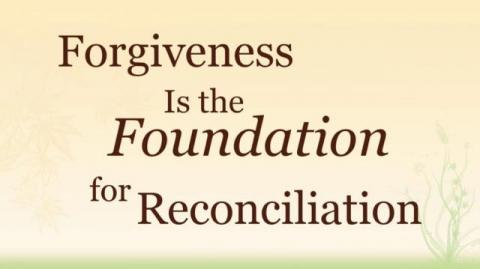Now we have to shape what some have started calling; The Church at Home. Although I keep asking myself; What do those who do not have a home do? For this reason, at the same time, I am declaring today in our Holyrood Church a Lenten day of prayer, fasting and reading the Bible in the Time of the Coronavirus.
Reconciliation recipe

Good morning, happy Wednesday, and many blessings.
In the Gospel of today and of tomorrow we read and meditate on the second half of the Discourse on the Community. Today’s Gospel speaks about fraternal correction (Mt 18:15-18) and of prayer in common (Mt 18:19-20). The Gospel of tomorrow speaks about pardon (Mt 18:21-22) and presents the parable of pardon without limitations (Mt 18:23-35). The key word in this second part is “to forgive”. The accent is on reconciliation. In order that there may be reconciliation which will allow the little ones to return, it is important to know how to dialogue and to forgive, because the foundation of fraternity is the gratuitous love of God. It is only in this way that the community will be a sign of the Kingdom.
It is not easy to forgive. There is a certain grief which continues to strike the heart as with a hammer. There are those who say, “I forgive, but I do not forget!” There is resentment, tensions, clashes, diverse opinions, and offenses, provocations which render pardon and reconciliation difficult.
In most churches today – and I don’t think Holyrood is any different than any other church – what typically happens when people disagree with each other is that the one who is upset says nothing to the person who has caused the upset. But the angry person does talk to his or her friends and supporters and begins to gather sympathetic ears for a message that the other person has done the injured party wrong. Soon there is a large and growing group who know of the wrong done and they all begin to search their own memory banks for examples of when the person wronged them as well. Meanwhile, the person who is now being vilified and whose list of transgressions grows every day, has no idea that he or she has done anything to anyone. Then when the problem ultimately comes to a head, the original issue has either been completely forgotten or has transformed into something entirely different than the slight it started as. Meanwhile, the person who started it all with some relatively minor act has become a major villain, – simply from the power of bad feelings, insinuation, and accusations, boiling over time. This is precisely what Jesus talks about in Matthew 18.
Jesus lays out how these things are to be handled by a Christian community. And quite simply, His prescription is to talk about things openly, honestly, and directly, person-to-person. Jesus wanted people who had been hurt to talk directly to the one who hurt them and to lay things out in an honest fashion, in hopes of having the issues worked out. Jesus doesn’t say, “Ambush them.” And neither does He say, “Meet at high noon, in the middle of Broadway street and shoot it out. Let the best man win.” Instead, He says that we should speak honestly and directly with each other, not in anger, but also not hiding the hurt that has been done. Now note that He does not suggest that one person should be the winner and one the loser. No … what He wants from this direct communication is reconciliation. Both parties getting back, as much as is possible, to a place of shared care and concern – of forgiveness and understanding. Are you ready to do this?
Blessings
Fr. Luis+
- Log in to post comments
